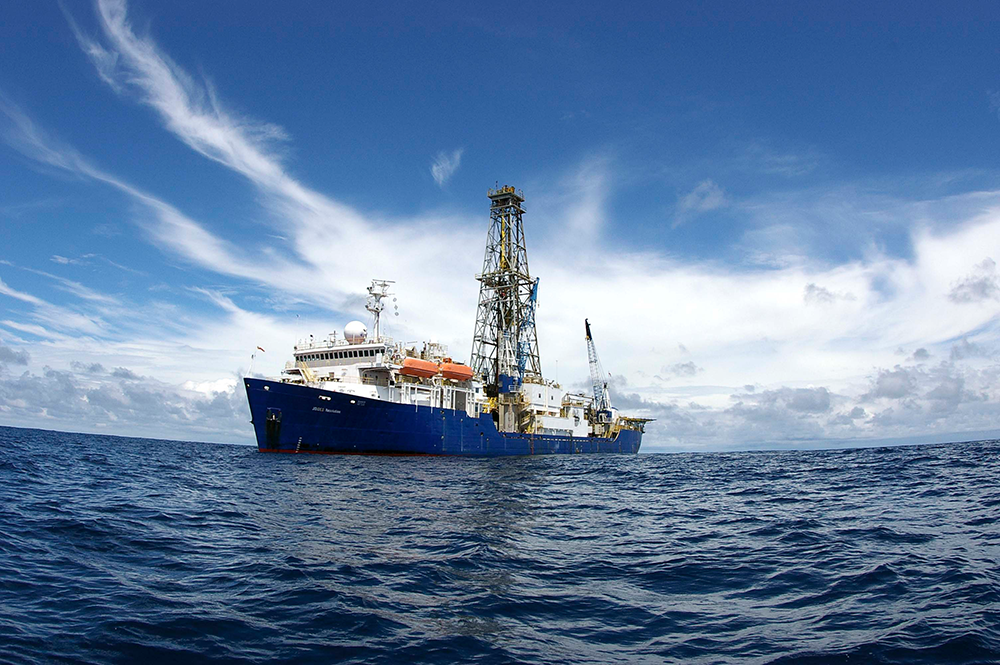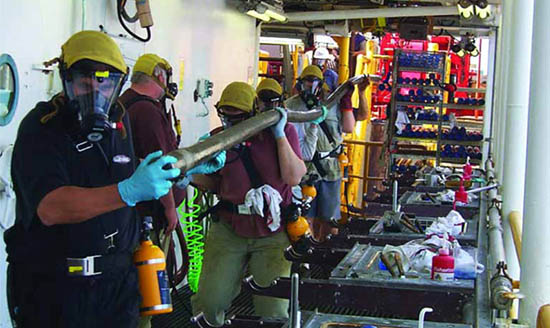 The Live Science Center of the Algarve, in Faro, opens today a temporary exhibition on national participation in the International Program for the Discovery of the Oceans (IODP), using some of the dissemination materials produced at the Escola Secundária de Loulé and the University of Algarve and others directly from the education department of the ECORD/IODP programme.
The Live Science Center of the Algarve, in Faro, opens today a temporary exhibition on national participation in the International Program for the Discovery of the Oceans (IODP), using some of the dissemination materials produced at the Escola Secundária de Loulé and the University of Algarve and others directly from the education department of the ECORD/IODP programme.
This exhibition opens on the same day that the IODP/ECORD Portugal Day takes place in Lisbon at the Pavilion of Knowledge. But what is it about?
The ocean floor represents about two thirds of the surface of the Earth's lithosphere and are composed of rocks and sediments that contain information of great scientific value for the reconstruction of the Earth's history, not only from a geological point of view, but also from a point of view biological or oceanographic. However, this information can only be collected and investigated by sampling the deep ocean floor and its diversity.
From this need to sample hard-to-reach ocean bottoms, such as abyssal bottoms, subduction zone bottoms or even bottoms under sea ice covers, the idea of bringing together technological, financial and human efforts at an international level was born.
Thus, in 1998, Portugal joined the program ODP-Ocean Drilling Program – where several countries already collaborated, through the sharing of resources and namely in the use of the American oceanographic vessel joides resolution to drill the ocean floor.
It was during this program that, when studying a sedimentary core (ODP171B) from a drilling carried out in the Gulf of Mexico, evidence was found of the impact of a meteorite, and its consequences, at the K/T limit, the Cretaceous-Paleogene limit corresponding to the end of the dinosaurs' reign.
The success of the ODP program gave rise to a new international cooperation program known as IODP, an acronym used for “Integrated Ocean Drilling Program” (Integrated Ocean Drilling Program), until 2013, and for “International Program for Ocean Discovery” (International Ocean Discovery Program), from that year to 2023.
This new phase of the international IODP program reveals the growing importance of the study of the ocean floor which, contrary to what many people think, is not limited to research in Earth Sciences from a restricted geological perspective, but rather to its broader sense of Sciences that they study. the global processes.
 In this way, the mission of the current IODP program aims to respond to global scientific challenges, such as i) Climate and Ocean Changes, reading the past in order to envision the future, ii) the frontiers of life, accessing the deep biosphere, its biodiversity and environmental impacts on these ecosystems, iii) connections on Earth, revealing deep processes and their influence on surface environmental conditions, and iv) Earth dynamics, assessing risks and processes relevant to the human temporal scale.
In this way, the mission of the current IODP program aims to respond to global scientific challenges, such as i) Climate and Ocean Changes, reading the past in order to envision the future, ii) the frontiers of life, accessing the deep biosphere, its biodiversity and environmental impacts on these ecosystems, iii) connections on Earth, revealing deep processes and their influence on surface environmental conditions, and iv) Earth dynamics, assessing risks and processes relevant to the human temporal scale.
Over these years, Portuguese participation in these programs has taken various forms, from the presence of a delegate and an alternate on the ECORD committee, the European Consortium for ocean drilling research (European Consortium for Ocean Research Drilling) and in the ESSAC Committee, ECORD Scientific Advisory and Support Committee (ECORD Science Support and Advisory Committee), scientific participation with Portuguese scientists involved in various oceanographic missions or even participation in dissemination and education, through the promotion of conferences, seminars or workshops and training.
With regard to scientific dissemination and education, mention should be made of the contribution of Hélder Pereira, master of the University of Algarve and professor of Biology and Geology at the Escola Secundária de Loulé, who, in addition to organizing the first “ECORD School of Rock” in Portugal, he was also the only Portuguese to participate in a mission aboard the joides resolution, as "Advisor for education and scientific dissemination" (Exp. 339 -Mediterranean Outflow, in 2011).
However, there are many other examples of national participation in the IODP, and it is with the aim of publicizing and promoting this participation as a whole, but also to show its future opportunities, that, today, November 3rd, takes place at the Pavilion of Knowledge o Day IODP/ECORD Portugal, and that the CCV do Algarve opens a temporary exhibition on the same theme.
Author Algarve Living Science Center


















Comments